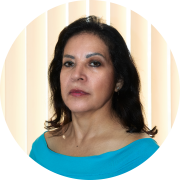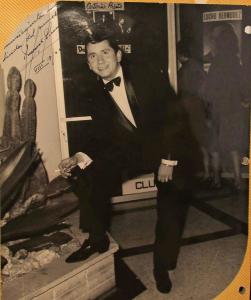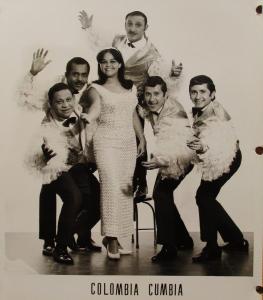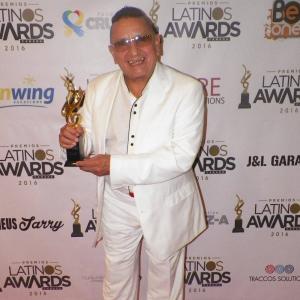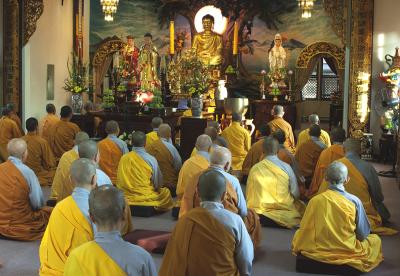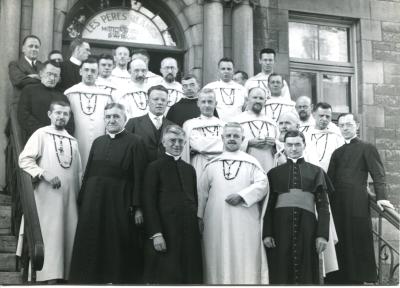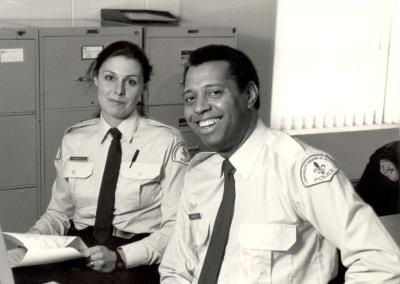Award-winning master percussionist Joé Armando was a Latin music pioneer in Canada and a towering figure in the Latin music and jazz scenes, earning him the nickname “Montréal’s Tito Puente.”
José Armando Torres holds a special place in the history of Montréal’s Latin American community, entertainment venues, and music scene. The Latin music pioneer came to Montréal in 1967 and remained in the city for most of his career as a musician and composer. In the arts community he is recognized as an influential figure in many styles of Latin and Afro-Caribbean pop and jazz. In 2016, Latin Awards Canada honoured José Armando Torres with a lifetime achievement award.
Origin and influences
The percussionist known as Joé Armando and nicknamed “Montréal’s Tito Puente” was born in Bogotá, Colombia, as José Armando Torres. He developed a signature style that combines rhythms from around the world, and his lifelong dedication and love of music earned him a reputation as a master of percussion.
Armando began playing music in high school when he joined the band at Institute De La Salle in Bogotá. When he was fourteen, a friend from New York played him Tito Puente’s legendary 1956 percussion album, Puente in Percussion. A who’s-who of Latin and Afro-Caribbean percussionists—Tito Puente, Ramón “Mongo” Santamaría, Carlos “Patato” Valdés, William “Bobo” Correa, and Robert “Bobby” Rodríguez—came together in a New York studio to record with two of the era’s top Latin music producers, Ralph Seijo and Jerry Masucci. Armando recalls that Puente in Percussion changed his life and that Tito Puente became his idol.
Armando’s music career began in earnest when he was seventeen. In 1959, brilliant pianist Joe Madrid invited him to the Grill Colombia in Bogotá, where Armando sat in with an outstanding group of musicians, including Alex Acosta “Muñecon,” Antonio María Peñaloza, Armando Manrique, Francisco Cristancho, and Julio Arnedo. Later, Armando and his group played at the Candilejas Grill in Bogotá, alternating with the big band of Lucho Bermúdez, a leading twentieth-century performer and composer of Colombian popular music. In Colombia, Armando performed with other high-profile musicians including Antonio María Peñaloza, Alci Acosta, Pacho Galán, Joe Madrid, Jimmy Salcedo, and Juan Piña. The group that launched Armando in the music business was called “Joé Armando y su Sabor.” As early as the 1960s, Armando’s exceptional talent was gaining traction.
A promising future
While Joé Armando was making a name for himself with his band, he met well-known musician Carlos Ramírez, a famous Colombian baritone who became a Hollywood actor in the 1950s. Ramírez suggested Armando come to Canada to perform in Montréal at Expo 67. It was Armando’s first international performance.
On his way to Montréal, Armando stopped over in New York, where he saw Tito Puente perform. At the show, a Colombian musician who knew Puente introduced the two percussionists. A friendship was born, and the bond grew stronger when Armando put together a concert for Puente in Montréal. In Armando’s words, “sharing the stage with your idol is an immense privilege.” He also accompanied Tito Puente at his last performance with his group at the Métropolis in Montréal, in 1997.
In Montréal for Expo 67
At Expo 67, Armando played the timbales with Orquesta Colombia Cumbia, which featured a pianist, bassist, saxophonist, and two singers from Lucho Bermúdez’s band: Rosiris Martínez and Pati Ruiz. Performances were held at the Youth Pavilion at La Ronde, on Saint Helen’s Island. Orquesta Colombia Cumbia shared the stage with a wide range of pop, folk, and jazz acts, playing to a crowd. As part of the Expo contract, the band played further dates across Québec. They were so well received that Café Tropicana, a renowned Montréal dance club, offered the band a six-month contract.
Armando’s success in Montréal attracted attention and jump-started his show-business career, opening doors across North America. In 1970, he was invited to perform in the Caribbean (Aruba, Curaçao, Cuba, and Puerto Rico). These dates were followed by concerts in Las Vegas, Los Angeles, and San Francisco in 1973. Montréal remained Armando’s home base, but at the end of one tour abroad, none of his band members came back to Canada, heading instead for Miami, Los Angeles, and Colombia. Armando returned to Montréal alone, where he played with multiple bands, took part in various projects, and became a Canadian citizen in January 1982.
Dreams come true: Sharing the stage with legends
In 1977, Armando shared the stage with Emerson, Lake & Palmer at Montréal’s Olympic Stadium. In 1984, he collaborated with Michel Séguin and Miroslav Vitouš, of legendary jazz fusion group Weather Report, and two years later he performed with his friend and idol Tito Puente at the Montréal Spectrum. In 1995, leading jazz-lover and critic Len Dobbins listed Armando as one of the ten must-see concerts at the Montréal jazz festival. In 1998, Armando opened for Yuri Buenaventura at the FrancoFolies music festival. When Tito Puente passed away in 2000, Armando and his band were invited to play a tribute concert. The following year, Armando headlined at the Festival International de Jazz de Montréal. In 2006, he was a top draw at the Festival International des Rythmes du Monde de Saguenay. And in 2012, he was invited to tour Mexico and the United States. Over his long career, Armando has garnered recognition and awards, culminating in a 2016 lifetime achievement award from Canada’s Latin Awards, recognizing him as a pioneer of salsa and Latin jazz in Canada.Passion and success
Looking back over the highlights of his Montréal music career, Joé Armando describes how it was shaped by the city’s long tradition of festivals and special events. In the 1940s, the city was part of an explosion of new music that swept North America, and home to many clubs that featured big bands. He waxes nostalgic as he recalls a Montréal bustling with music venues, dance clubs, and cafés. For example, he fondly remembers how Café Saint-Jacques would open its doors at ten a.m., be full an hour later, and stay open until three a.m.
Asked to share the secret of his success on the Montréal music scene, Armando has a theory: “Life is all about passion. Without passion, artists wouldn’t leave a mark, or create any work of note. Passion is what it takes for artists to dedicate themselves to their audiences and to their creative pursuit.” Armando believes that artists have a fundamental need for “abstract” things to fuel passion and creative growth, and that they need to nourish them with “music, reading, poetry, and love.” These are the elements that have given his soul the sustenance it needs to create and perform music, as he has done throughout his career. Music, especially jazz, has given Armando a feeling of “intellectual fulfillment, spiritual growth, and emotional stability.”
An enduring legacy
Although he is a self-taught musician who never went to university, Armando has been invited to lecture and play music at McGill and Concordia universities and at Cégep Édouard-Montpetit in Longueuil. He speaks about music with so much passion that he has become a mentor figure for Latin music groups in Montréal and one of the city’s leading promoters of Latin American art.
Armando’s last band was Joé Armando Générations, where he played the timbales. The band included eminent Canadian jazz musicians Christine Janson (alto saxophone), Joel Miller (tenor/soprano saxophone), Aaron Doyle (trumpet), Yoel Diaz (piano), Alex Bellegarde (bass), Blankita Torres (vocals), Diomer Gonzalez (bongo), Yoito Alexis Torres (congas) and, of course, the bandleader: José Armando Torres.
Joé Armando will be remembered as a major figure in the history of Colombian music and one of the most important musicians of Latin American origin in Canada. His contributions to music and society as a whole are clear for all to see.
Entretien avec José Armando Torres, par Reina Victoria Vega V., le 14 mai 2017.
CURIEN, Pauline. L’identité nationale exposée. Représentations du Québec à l’Exposition universelle de Montréal 1967 (Expo 67), Thèse (Ph. D.), Université Laval, Département de science politique, Faculté des sciences sociales, 2003.
